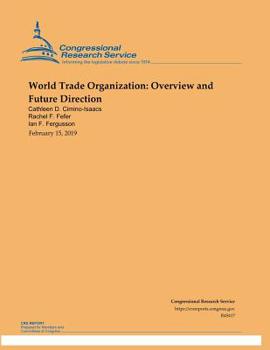World Trade Organization: Overview and Future Direction
Historically, the United States' leadership of the global trading system has ensured the United States a seat at the table to shape the international trade agenda in ways that both advance and defend U.S. interests. The evolution of U.S. leadership and the global trade agenda remain of interest to Congress, which holds constitutional authority over foreign commerce and establishes trade negotiating objectives and principles through legislation. Congress has recognized the World Trade Organization (WTO) as the "foundation of the global trading system" within trade promotion authority (TPA) and plays a direct legislative and oversight role over WTO agreements. The statutory basis for U.S. WTO membership is the Uruguay Round Agreements Act (P.L. 103-465), and U.S. priorities and objectives for the General Agreement on Tariffs and Trade (GATT)/WTO have been reflected in various TPA legislation since 1974. Congress also has oversight of the U.S. Trade Representative and other agencies that participate in WTO meetings and enforce WTO commitments. The WTO is a 164-member international organization that was created to oversee and administer multilateral trade rules, serve as a forum for trade liberalization negotiations, and resolve trade disputes. The United States was a major force behind the establishment of the WTO in 1995, and the rules and agreements resulting from multilateral trade negotiations. The WTO encompassed and succeeded the GATT, established in 1947 among the United States and 22 other countries. Through the GATT and WTO, the United States, with other countries, sought to establish a more open, rules-based trading system in the postwar era, with the goal of fostering international economic cooperation and raising economic prosperity worldwide. Today, 98% of global trade is among WTO members. any observers are concerned that the effectiveness of the WTO has diminished since the collapse of the Doha Round of multilateral trade negotiations, which began in 2001, and believe the WTO needs to adopt reforms to continue its role as the foundation of the global trading system. To date, WTO members have been unable to reach consensus for a new comprehensive multilateral agreement on trade liberalization and rules. While global supply chains and technology have transformed international trade and investment, global trade rules have not kept up with the pace of change. Many countries have turned to negotiating free trade agreements (FTAs) outside the WTO as well as plurilateral agreements involving subsets of WTO members rather than all members. Certain WTO members have begun to explore aspects of reform and future negotiations. Potential reforms concern the administration of the organization, its procedures and practices, and attempts to address the inability of WTO members to conclude new agreements. Proposed DS reforms also attempt to improve the working of the dispute settlement system, particularly the Appellate Body-the seven-member body that reviews appeals by WTO members of a panel's findings in a dispute case. Some U.S. frustrations with the WTO are not new and many are shared by other trading partners, such as the European Union. At the same time, the Administration's overall approach has spurred new questions regarding the future of U.S. leadership and U.S. priorities for improving the multilateral trading system. Concerns have emphasized that the Administration's recent actions to unilaterally raise tariffs under U.S. trade laws and to possibly impede the functioning of the dispute settlement system might undermine the credibility of the WTO system. A growing question of some observers is whether the WTO would flounder for lack of U.S. leadership, or whether other WTO members like the EU and China taking on larger roles would continue to make it a meaningful actor in the global trade environment.
Format:Paperback
Language:English
ISBN:1092787305
ISBN13:9781092787307
Release Date:January 1
Publisher:Independently Published
Length:64 Pages
Weight:0.38 lbs.
Dimensions:0.1" x 8.5" x 11.0"
Customer Reviews
0 rating





